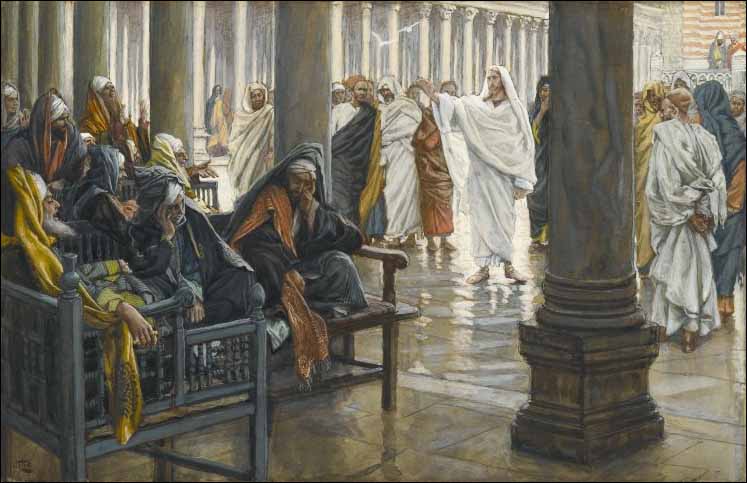Today’s reading: Deuteronomy 27–28:19; Psalm 119:1–24; Isaiah 54; Matthew 2
June 22nd, 2016
Blessed are the undefiled in the way, who walk in the law of the Lord. Blessed are they that keep his testimonies, and that seek him with the whole heart. They also do no iniquity: they walk in his ways. Thou hast commanded us to keep thy precepts diligently. O that my ways were directed to keep thy statutes! Then shall I not be ashamed, when I have respect unto all thy commandments. I will praise thee with uprightness of heart, when I shall have learned thy righteous judgments. I will keep thy statutes: O forsake me not utterly. Wherewithal shall a young man cleanse his way? by taking heed thereto according to thy word. With my whole heart have I sought thee: O let me not wander from thy commandments. Thy word have I hid in mine heart, that I might not sin against thee. – Psalm 119: 1-11
To me the law is a beautiful thing. It is full of judgement, mercy and faith (Matthew 23:23-24). The law is love written on our hearts (Romans 13:10, Hebrews 8:10). In my estimation, so that we are hardwired with the ability to love others with the love of Jesus Christ. Like an operating system for our soul, when we divert from the law and choose not to love another, the system gets confused and pushes back; “processing, processing, processing…” God reboot my soul, reset my system anew with love. My soul longs for it. God’s law leads me, directs me, governs me and to the extent that I accept this truth, seek after it and hold to it moment-by-moment, my soul is at rest in the peace that transcends all understanding (Philippians 4:7).
Still from time to time I encounter a sort of push back amongst Christians when the phase God’s law is used. For some the word law carries with it evil connotations of the very worst sort. To the extent the word ‘law’ or phrase ‘God’s law’ is perceived as an enemy of love. A fear arises in some that God’s law will push non-believers away. The phase “old testament god” is used, as if there were such a thing. God is God and has always been, no shadow of turning (James 1:17, Hebrews 13:8). Oh how this saddens me. I hate this perversion of my Master’s holiness. My anger is with the evil that has managed to redefine the meaning of the word law through hypocrisy.
Woe unto you, scribes and Pharisees, hypocrites! for ye pay tithe of mint and anise and cummin, and have omitted the weightier matters of the law, judgment, mercy, and faith: these ought ye to have done, and not to leave the other undone. Ye blind guides, which strain at a gnat, and swallow a camel. – Matthew 23:23–24

Gnats and camels alike where considered unclean. Camels were likely the largest unclean thing while gnats were likely among the smallest. Religious leaders would strain out gnats before drinking wine to be sure to uphold the law and not unknowingly consume something unclean. Jesus here describes a rather comical situation. Imagine watching someone meticulously straining wine through a linen to “be sure” to uphold the law in every way, the whole time a camels is somehow sitting in their cup, which they then gulp down proudly.
In my estimation, Jesus here criticizes the religious leaders for their blinding attention to detail that caused them to lead others astray from the truth of the law. My prayer is that the Pharisees’ and hypocrites’ perversions of the law will be untwisted and made straight. That we may dismiss the worldly definition of God’s law, wave God’s banner and return to the truth, proclaiming a biblical definition of His law. That we would all fall in love with God’s beautiful law. That we would never be deceived into a judgemental nor self righteous nature. That we would not be fear-driven conditional lovers and so pervert God’s law. That any inner Pharisees within us would be vanquished by God’s truth (Psalm 139:23-24).
Judgement is not about one person assessing another’s keeping of the law but rather the law helping one keep their own affairs in order (Isaiah 1:17, Jeremiah 22:3; Zechariah 7:9–10; Micah 6:8; Habakkuk 2:4). Praise God for writing His law on our hearts that we may live abundantly (Jeremiah 31:31-34)!
Keeping the law is beautiful
Straining out the gnat is not evil in any way. Jesus makes it clear that we should do it (Matthew 23:23). His criticism is that the Pharisees had done it to the dismissal of things that were more important and where lost thinking they had not only kept the law but kept the finer points that others had missed.
Loving the LORD thy God with all one’s heart and soul and mind and desiring to do His will in all things; Beautiful. Thinking one’s self capable of judging another’s love for God; Ugly. Deep concern for one’s own stewardship; Wise. Being overly concerned for someone else’s; Foolish.
Judgement is a gift from God to help us with our stewardship. Let us not pervert this gift by trying to unwrap it for another. Instead let us rejoice in it, praising God for His gift to us in humility as we are judged in grace and mercy to the glory of God as we are made whole and mature in Christ (1 John 4:17).
Let us also consider the inverse. If we pass by and see another straining out a gnat and think, “that hypocrite” are we not in judgement of another? By straining a gnat have they judged another? If so how is one to obey Jesus command to let their light shine? (Matthew 5:16)
Shine Your light oh LORD and vanquish darkness. Here is truth about the law:
Let us hear the conclusion of the whole matter: Fear God, and keep his commandments: for this is the whole duty of man. – Ecclesiastes 12:13
A new commandment I give unto you, That ye love one another; as I have loved you, that ye also love one another. By this shall all men know that ye are my disciples, if ye have love one to another. – John 13:34–35
Love worketh no ill to his neighbour: therefore love is the fulfilling of the law. – Romans 13:10
Master, which is the great commandment in the law? Jesus said unto him, Thou shalt love the Lord thy God with all thy heart, and with all thy soul, and with all thy mind. This is the first and great commandment. And the second is like unto it, Thou shalt love thy neighbour as thyself. On these two commandments hang all the law and the prophets. – Matthew 22:36–40
Therefore all things whatsoever ye would that men should do to you, do ye even so to them: for this is the law and the prophets. – Matthew 7:12
Extra Credit:
- Check out the eight woes of the Pharisees, this post mostly drew on the fifth.
- Golden Rule thought experiment on the power of God’s law in love
Scripture: Matthew 7:12, Jeremiah 31:31-34, Ephesians 2:10, 1 Corinthians 13:5
God gives us a simple and basic, at the most fundamental level, instruction on how to keep the law well. Many call it the Golden Rule (Matthew 7:12). I say it is most fundamental because it is by way of that which we are most intimate with than any other; ourselves. We know exactly how we should like to be treated and regarded and so forth. Even if not consciously, subconsciously we are hardwired to love ourselves well. Follow along for one simple illustration of this truth. We know that love thinketh no evil or, put another way, keeps no record of wrongs (1 Corinthians 13:5).
What if we were to apply how we feel about ourselves in this matter on to others? In order to explore this question I encourage you to join me in a thought experiment on your being wrong. Popular exercise, I know.
- Name a time when you were wrong; no excuses, no circumstances at work that were out of your control, no anything but you and your wrongness hanging out being wrong.
- Let’s say you came up with something. Then let us go to how long it took to recall. Checking all those excuse boxes may have taken a bit of time. Well that one wasn’t really all my fault, etc. So how long did it take you to recall?
- Now think back to the first time you had admitted you were wrong in this instance. Think on how quickly and completely you forgave yourself. Did it even take a second? Did it really even register?
Is not love a beautiful thing?!?! Praise God that His law is written on our hearts! (Jeremiah 31:31-34) His forgiveness, His grace and His mercy are written on our hearts!!! The questions then become, does it take you as long to come up with something someone close to you has done wrong? Has it taken you more than a second to dismiss it from your mind?
The point here is that our love of ourselves is much nearer perfection in fulfilling the law than our love for our fellows. God has written it on our hearts to help us, to enable us for the good work He has prepared for us (Ephesians 2:10). How can we not fall in love with His law? Is it not beautiful? Does it not equip us to save souls and rescue others from bondage as it all the time rescues us from a hopeless existence with ourselves? God Your beauty is unimaginable! Your goodness unsearchable! Your ways are beyond me my God and my redeemer! Praise Your Name!
